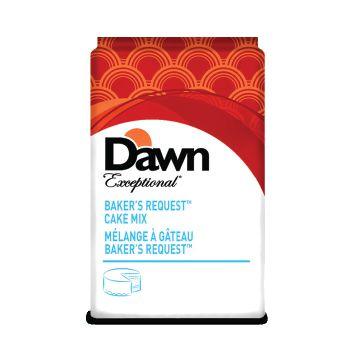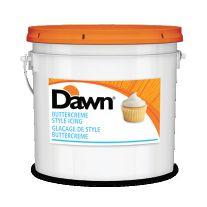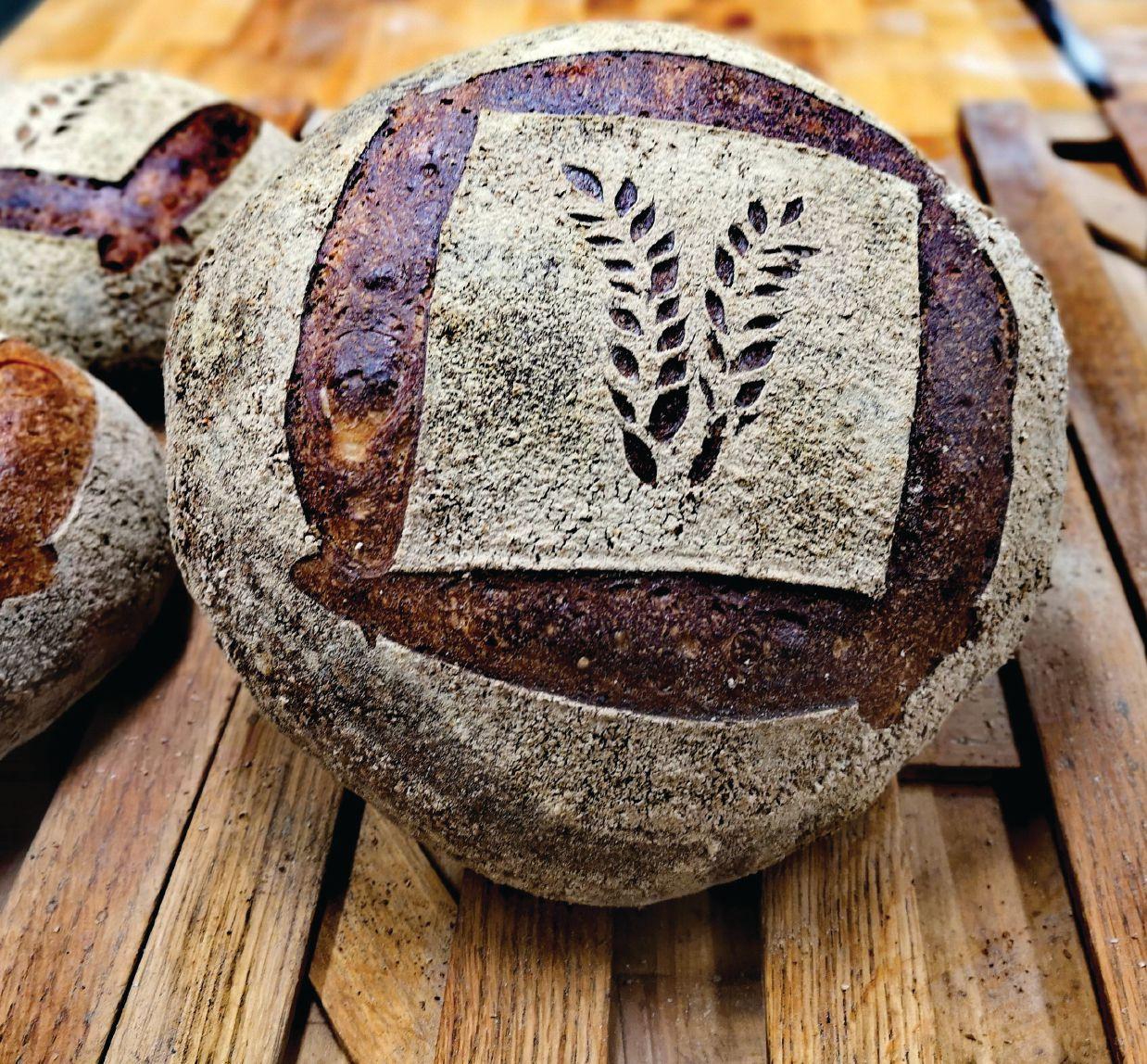
Extensive North American supply, milling footprint & portfolio
Consistent quality & performance
Traceability & transparency

Unparalleled technical expertise & support
Long-term contract stability


Extensive North American supply, milling footprint & portfolio
Consistent quality & performance
Traceability & transparency

Unparalleled technical expertise & support
Long-term contract stability
The world of organic flour and grain can be unpredictable and challenging. We’re making organic reliable, efficient, scalable and easy for you at every step of the supply chain.
That’s the Ardent Mills organic advantage.


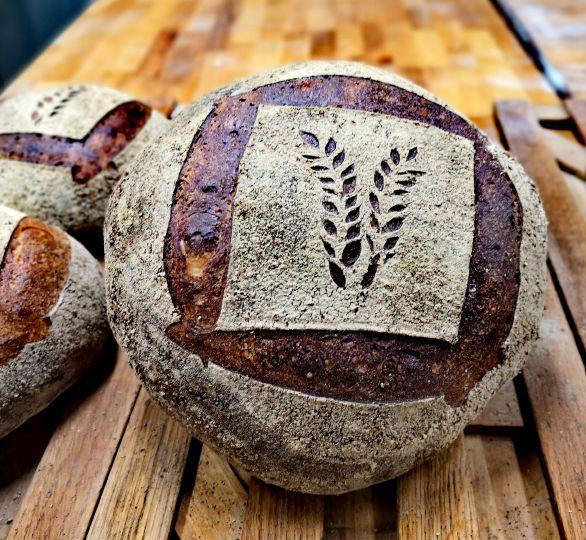
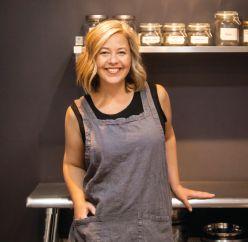
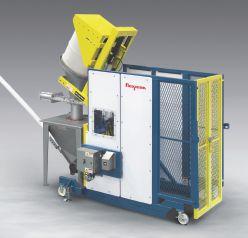

BY NAOMI SZEBEN
Last year marked a very different “Jake the Baker” contest. Founding Sponsor, Ardent Mills and the judges had selected the winner, but unlike every year since its inception, the winner had to keep mum much, much longer.

Under normal circumstances, the winning bakery is selected in the spring, and instructed not to share the news until they appear on the cover of Bakers Journal. The winning bakery, in this case, was St. Joseph Bakery of St. Catharines. The family-run bakery would have been invited to the Bakery Showcase in Toronto in May 2020. However, by March of 2020, the COVID pandemic had other plans. Poor Derek Kedzierski couldn’t share the good news to family, friends or clients for a month...then two months. Finally after eight months, the patient Kedzierski family was allowed to spill the beans, and see their bakery on the cover of Baker’s Journal. The bakery’s owners were good natured about the many delays; they themselves were unsure what the future would look like for the food industry. Many bakeries and delicatessens had to close off the indoor eating facilities, establish curbside pickup or consider delivery services. Last March, nobody knew what the year had in store.
}The pandemic upended many people’s plans. The Bakery Showcase tentatively rescheduled the show, and the contest’s Founding Sponsor and judges looked forward to crowning the St. Joseph Bakery as a community champion. By August, the Showcase was rescheduled again, this time for September 2021. Nobody travelled or attended live trade shows for a year. Canada experienced lockdown after lockdown, but bakeries that had strong social media and community ties thrived. Smaller, newer companies struggled. This was the year that highlit the need for a strong web and social media presence for bakeries. Food industries that could pivot to meet local neighbourhood needs stood out, like Khaos Artisan Kitchen (August/ September 2020.) Owner Kymm Moore turned the garage into a small farmer’s market, sold sourdough starter and gave online lessons and tips for home bakers. Innovation and quick response times were the defining factors for a bakery’s survival during the pandemic.
This was the year that highlit the need for a strong web and social media presence for bakeries. Food industries that could pivot to meet local neighbourhood needs stood out, like Khaos Artisan Kitchen.
This year, Jake the Baker presents a new name but espouses the same values to its contest. The Inspirational Bakery continues its search for a baker or bakery that is creative with their baked goods, and also is considered a success in their community. How is your bakery involved in the neighbourhood? How do you connect with your clients? What inspired you to open a bakery in the first place? Put your thoughts to paper and enter the newly named “Inspirational Bakery Contest.” If you can’t think of ways you make a difference, ask your returning clients why they choose to come to you. Give a listen to Bakers Journal’s “On The Rise” podcasts, and listen to the shortlisted entries. Learn from the stories that caught the Founding Sponsor’s eyes and tugged at readers hearts; you might be inspired enough to share your story, and become 2021’s Inspirational Bakery. / BJ

APRIL 2021 | VOL. 81, NO. 3
Reader Service
Print and digital subscription inquires or changes, please contact Beata Olechnowicz, Audience Development Manager Tel: (416) 510-5182 Fax: (416) 510-6875
Email: bolechnowicz@annexbusinessmedia.com
Mail: 111 Gordon Baker Rd., Suite 400, Toronto, ON M2H 3R1
EDITOR | Naomi Szeben editor@bakersjournal.com 416-510-5244
TECHNICAL
EDITOR | Julie Istead, Puratos Canada jistead@puratos.com
NATIONAL ADVERTISING
MANAGER | Stephanie Jewell sjewell@annexbusinessmedia.com 705-826-2254 1-888-599-2228 ext. 268
ACCOUNT COORDINATOR | Kathryn Nyenhuis knyenhuis@annexbusinessmedia.com 416-510-6753
MEDIA DESIGNER | Alison Keba
GROUP PUBLISHER/VP SALES | Martin McAnulty mmcanulty@annexbusinessmedia.com
COO | Scott Jamieson sjamieson@annexbusinessmedia.com
Mailing Address P.O. Box 530, 105 Donly Dr. S., Simcoe, ON N3Y 4N5
PUBLICATION MAIL AGREEMENT NO. 40065710.
ISSN 0005-4097
Published ten times per year (Jan/Feb, Mar, Apr, May, Jun, Jul, Aug/Sept, Oct, Nov, Dec) by Annex Business Media.
Subscription Rates Canada — 1 Year $ 32.00 USA — 1 Year $73.50 Foreign - 1 Year $84.50 All prices in CAD funds.
Occasionally, Bakers Journal will mail in formation on behalf of industry-related groups whose products and services we believe may be of interest to you. If you prefer not to receive this information, please contact our circulation depart ment in any of the four ways listed above.
Annex Privacy Officer privacy@annexbusinessmedia.com Tel: 800-668-2374
Opinions expressed in this magazine are not necessarily those of the editor or the publisher. No liability is assumed for errors or omissions. All advertising is subject to the publisher’s approval. Such approval does not imply any endorsement of the products or services advertised. Publisher reserves the right to refuse advertising that does not meet the standards of the publication.
No part of the editorial content of this publication may be reprinted without the publisher’s written permission.
© 2021 Annex Publishing & Printing Inc. All rights reserved. Printed in Canada.

Lesa re does. In fact, our Red Star® Organic Yeast is the only commercially available organic yeast made in the U.S. The organic bakery market continues to rise, and bakers who seek to rise with it must use organic yeast to earn 100% organic certification. Red Star is a name you know and trust for quality yeast. Now, rely on our consistent supply of U.S.-made organic yeast, commercially available in all forms, qualities, and quantities.

Alongside our Red Star Organic Yeast, our full portfolio of organic dough conditioning systems supports bakers with organic reformulation and product line extensions. Our expertise and solutions apply to white and wheat breads, baguettes, bagels, pizza crusts, frozen dough, par-baked dough, buns, and more.
right from the start, start with the only source of U.S.-made organic yeast. Start with Lesa re.
briefly | Ardeent Mills latest acquisition; RC and Uber Eats team up; Handtmann announces a new sales manager For more news in the baking world, check out our website: www.bakersjournal.com
Ardent Mills announced its intention to purchase “substantially all” of the business operations of Hinrichs Trading Company, which sources, cleans and packs chickpeas. The move comes as part of Ardent Mills’ strategic growth plan to further invest in speciality ingredients and diversify its portfolio.
Headquartered in Pullman, Washington, Hinrichs Trading Company currently operates across five locations in Washington and Montana. Family-owned, Hinrichs Trading Company has over 30 years of chickpea experience, having been involved
in the production of the ingredient since it was first introduced into the U.S. Both parties aim to meet demands for alternatives to grain and provide gluten free options; Ardent Mills has already met objectives to extend its capabilities by achieving the following milestones::
• Acquisition of Andean Naturals’ quinoa operations in February 2020.
• Acquisition of an organic grain elevator in Klamath Falls, Oregon.
• Added capabilities in its Denver RiNo community mill to clean and pack specialty grains.
Chris D’Aoust, Managing Director of Handtmann Canada Limited, announced the appointment of Paul William Hill to the role of National Sales Manager, Bakery.
Hill brings 25 years of food industry sales, engineering and business development experience with special focus on applications, system integration and automation to his role. His background with purpose-built projects in bakery, confectionary, food and other areas will immediately add value to the Canadian solution customization group in Waterloo, ON. Paul will

also enhance the collaboration with the Handtmann Bakery Forum development team in Biberach, Germany and the expanded engineering services team that supports the North American Handtmann Bakery initiative.
Paul is a resident of Stoney Creek, Ontario and assumed his new role February 1, 2021. He is responsible for leading the national bakery sales of Handtmann and Inotec equipment in addition to delivering a range of smart factory bakery automation solutions that are engineered to meet the client’s requirements.
The Kaak Group added Silowacht to its streamlining process, by including vertical integration a part of its process.
The company announced in a press release that adding Silowacht leads to an "expansion of the product range with silo construction and distribution of ingredients to the kneader."
The release noted that this development offers the opportunity to respond to
the current, trend regarding longer bowl rest, first proofing and precision in dosing the desired products. By merging the production facilities for both thermo-oil and electric and gas-fired furnaces in Ala (IT), Kaak Group will also make an efficiency improvement in this product category.
Silowacht employs about 35 staff members and is managed by Jules Plevier.
Restaurants Canada is partnering with Uber Eats to provide $1 Million in grants to independently-owned restaurants across Canada as part of the Uber Eats “Eat Local Relief Effort”.
With many restaurants’ dine-in service closed or restricted with capacity limits, the “Eat Local Relief Grant” will provide 400 restaurants with a cash infusion when they could use it most.
“As we approach the one-year mark of the COVID-19 pandemic in Canada, it’s never been more important to support local restaurants,” said Lola Kassim, General Manager of Uber Eats Canada. “With the Eat Local Relief Grant program, we’ll provide $1 million to restaurants in need across Canada. We are excited to partner with Restaurants Canada on this important initiative.”
“We understand the times continue to be challenging, and the transition to dining in will be longer than anyone expected,” said Todd Barclay, President and CEO, Restaurants Canada, “so while we continue to advocate for favourable delivery options that allow restaurants to survive during this period, we are happy to partner with an industry ally like Uber Eats, who are committed to supporting restaurants during this ongoing crisis.”
Applications for the grant program are open, visit www.eatlocalreliefgrants. ca. To be eligible, restaurants are required to demonstrate financial need, have fewer than 5 locations, a maximum of 50 employees per location and have annual gross revenues in 2020 of less than $3 million per location. Preference will be given to applicants who have demonstrated a commitment to the local community, including restaurant staff, throughout the pandemic.
From aluminum foil trays to mobile drum tippers, Bakers Journal keeps you “in the know.” for more on new products for the baking industry, check out our website, www.bakersjournal.com
Two new profiles for aluminum foil tray manufacturer
Aluminum foil tray manufacturers, i2r Packaging Solutions, has added two new profiles to their popular Eclipse range - a unique collection of black and gold lacquered, aluminum foil containers designed for the premium ready meal sector. The additional trays take the range to 11 containers in various dimensions, which cover all different portion sizes and increase commercial choice.
The Eclipse containers complement high quality ‘ready to cook’ convenience products, including desserts. Designed to provide sturdiness, the range ensures consumer confidence throughout the storage, cooking and serving process.
The range offers advantages such as improved corrosion resistance against certain food types with a pH level outside the range 4-9, the prevention of food sticking to the container during cooking and a smooth rim that can be lidded with film to provide a leak proof pack to extend shelf life - this can be extended further by gas flushing if required using M.A.P.
Being 100 per cent recyclable, Eclipse containers include a clear recycling logo

as a call-to-action, reminding the consumer not to dispose of the container as part of their normal refuse, but to recycle wherever possible.
i2r recently announced that it is investing in new process lines and tooling to expand their wrinklewall range. The move follows increased demand internationally and in the UK market and will boost capacity and i2r’s product range by a further 20 per cent.
Operating as part of the Italian Laminazione Sottile Group, one of the leading global suppliers of aluminum products, i2r manufacture a comprehensive range of wrinklewall and smoothwall semi-rigid aluminum foil containers used throughout the food industry.

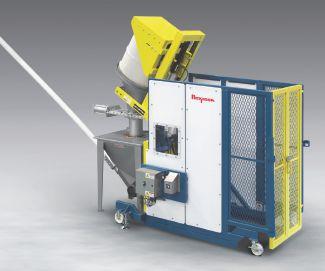
A new mobile TIP-TITE® Drum Tipper with safety cage allows hands-free, automated dumping of bulk solid materials from 115 to 200 litre drums throughout the plant, with no dusting or danger associated with sudden shifting of contents.
The three-sided carbon steel cage with safety interlocked doors is mounted on a mobile frame with quick-acting jack screws for stability. A platform raises the drum hydraulically, creating a dust-tight seal between the rim of the drum and the underside of a discharge cone.
A second hydraulic cylinder then tips the platform-hood assembly, stopping it at dump angles of 45, 60 or 90 degrees with a motion-dampening feature, causing the spout of the discharge cone to mate with a gasketed receiving ring on the lid of an enclosed hopper that charges a flexible screw conveyor.
A pneumatically-actuated slide gate at the spout can be opened once the discharge cone has sealed to the receiving ring to discharge material, and then closed before returning the drum to its original position, with no dust emitted throughout the cycle.
Constructed of carbon steel with stainless steel material contact surfaces, the unit is also available in all-stainless steel finished to food, dairy or pharmaceutical standards. Optional cone adapters allow for safe, dust-tight dumping of small-diameter drums and pails.
Organic ingredients are having a moment. In fact, according to the Canada Organic Trade Association, Canadians are buying more organic products year over year, despite being in a pandemic. Why?
There are myriad of complex factors that are playing into this – we’re in the middle of a health crisis; organic is perceived as a shortcut to cleaner label and minimally processed food; consumers are looking for a sense of control when it comes to health; and they are thinking more critically about what they put in their bodies – from ingredients to sourcing.
We’re living in a world that is dynamic and changing every day. It’s easy to feel like we’ve lost control and it’s natural for humans to look for ways to gain that back. One way consumers are doing this is through food and owning their health. Here, organic plays an interesting role since consumers consider organic a healthier option, a shortcut to clean label and as a path to help boost immunity. According to Ardent Mills’ insights team, in 2020 many consumers actively sought out foods they thought would be good for their health – organic included. Additionally, those that choose organic products do so out of lifestyle and belief standards rather than palette. In fact, 78 percent of Canadians cited health benefits as the main reason why they choose organic food items, according to a poll done by StatsCan.
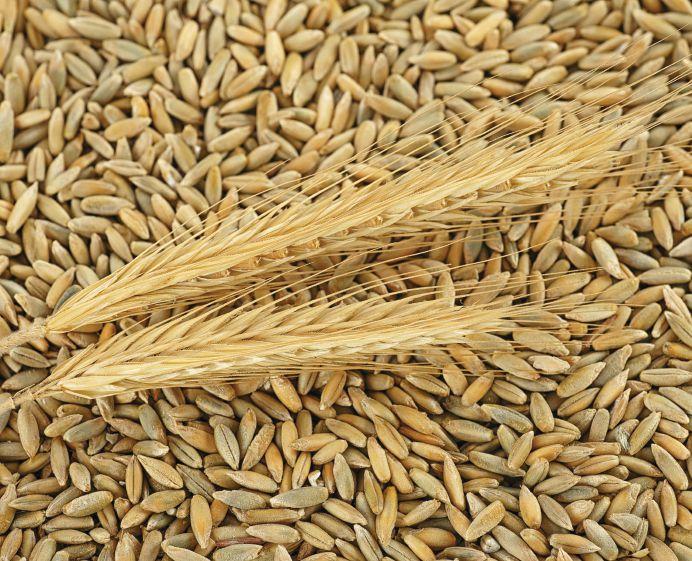
Bakeries, especially smaller ones, seem to be less aware of the health implications of trans fats.
}Try incorporating organic ancient grains like spelt and quinoa in your bakery applications to hit on the organic demand, while also bolstering the perceived healthforward trend by adding options for higher protein and fibre.
tions to hit on the organic demand, while also bolstering the perceived health-forward trend by adding options for higher protein and fibre.
A few ways to support this trend in your business is with organic desserts, artisanal breads and products for on-trend lifestyle diets, such as gluten free and keto. This can be as simple as having an organic artisanal bread for your sandwich offerings or incorporating organic flour into desserts for a healthy halo effect. To take this a step further, try incorporating organic ancient grains like spelt and quinoa in your bakery applica-
Another outcome of the pandemic is that consumers are thinking more about the details of their food inside and outside the package. Where does it come from? Who is growing it? Is it sustainable? As consumers are looking for this transparency, organic can be a great win for bakers.
In 2016, Ardent Mills launched our Organic Initiative aimed at helping farmers transition their wheat crops to organic. Since the launch of our Organic Initiative, Ardent Mills has expanded our organic footprint in terms of storing and processing organic flour and grains, and we continue to add to our organic portfolio.
Ardent Mills also partners with family
farms in our local communities in Western Canada. These close relationships provide a strong connection between our famers, our customers and their finished product. One organic farm partner, Grace Hill Farms, is situated in the wheat belt region of Mankota, Saskatchewan and supplies our Saskatoon mill with high quality, high performing wheat. Grace Hill Farms has a passion for organic farming rooted in their personal philosophy, which is to farm in a sustainable, synergistic fashion that benefits the land, wheat, their family and community. We’re beyond excited to work with a family whose values align directly with ours.
All in all, organic is a trend that’s here to stay. Its versatility extends beyond ingredient diversity and food applications to storytelling -- sustainability, transparency, healthy halo effect, and more. Because it transcends multiple trends and consumer demands, organic will remain an important category to keep an eye on. / BJ
Elaine O’Doherty is the Marketing Manager at Ardent Mills Canada.
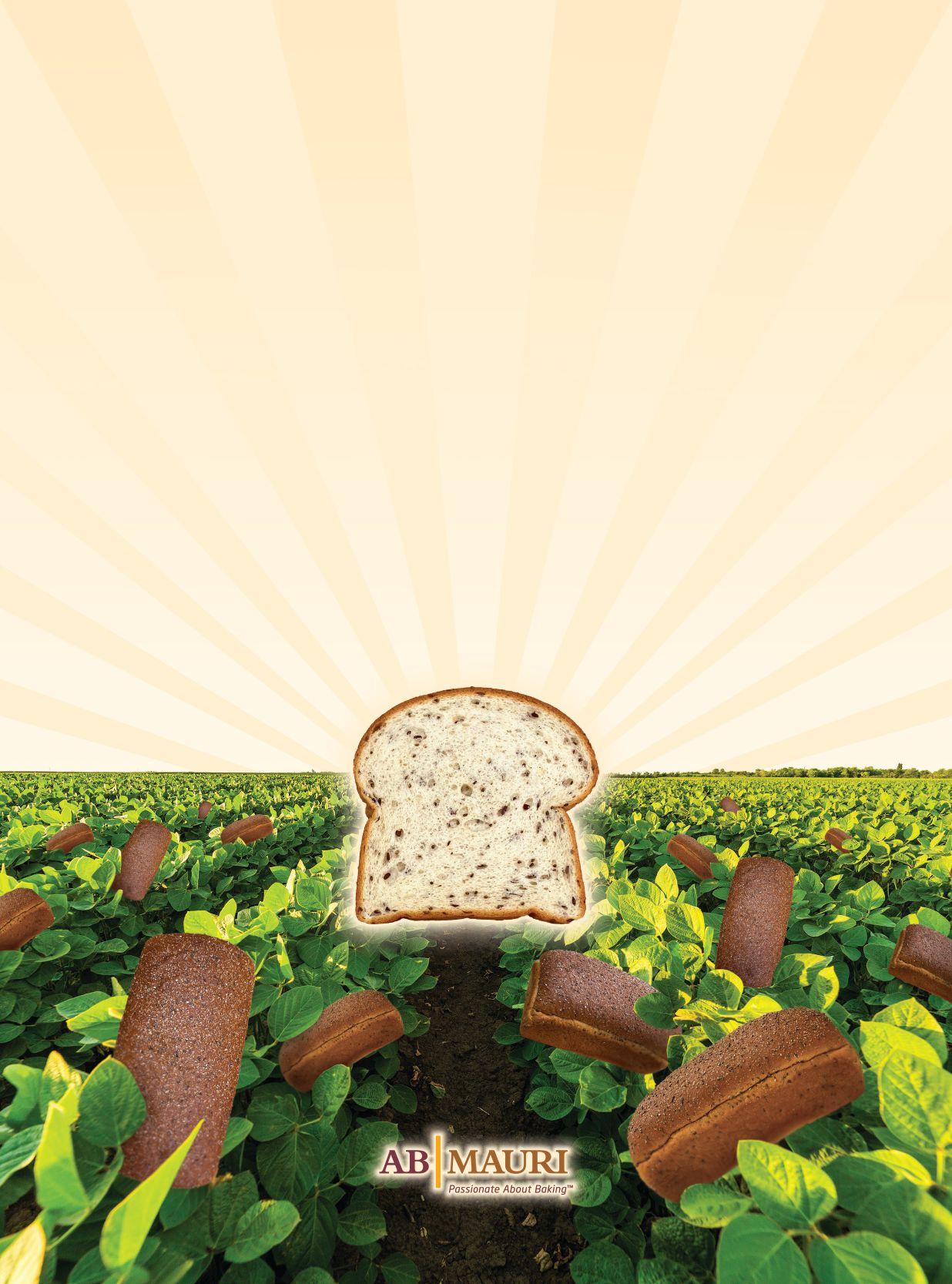



















More than ever, customers are insisting on organic foods. According to Agriculture and AgriFood Canada, annual retail sales of certified organic products in Canada are approximately $6.38 billion and have increased by almost $3 billion since 2012. For many who dwell in British Columbia, this has
been a way of life for decades.
Aphrodite’s, in Vancouver, British Columbia, is more than just a pie shop. It is also committed to wild, organic, local, and sustainable foods.
“We work directly with local farmers and producers to ensure that our menu has the smallest ecological footprint possible,” says owner Peggy Vogler. Aphrodite’s works with more than 20 farms, producers, and suppliers. Pies have built the business.
“Most of our pies are double crusted and traditional, with pinched edges. And our list remains pretty much standard. Our customers have their favourites that they always return for.”
Pies on the menu include raspberry rhubarb, strawberry rhubarb, blueberry, and peach, “We only make peach pie when peaches are in season,” says Vogel.
As for apple pies, she says it is hard to stick with the local
organic produce. “Local apples sell out quickly, and do not last in storage throughout the winter.” Most of the apples in Aphrodite’s pies, come from New Zealand, through trusted suppliers, as do other items that are not grown in Canada. Another pie that sells extremely well is the pumpkin variety. As soon as fall begins, these pies are on the must have list. Sales go wild leading up to Thanksgiving and then continue straight through until Christmas.
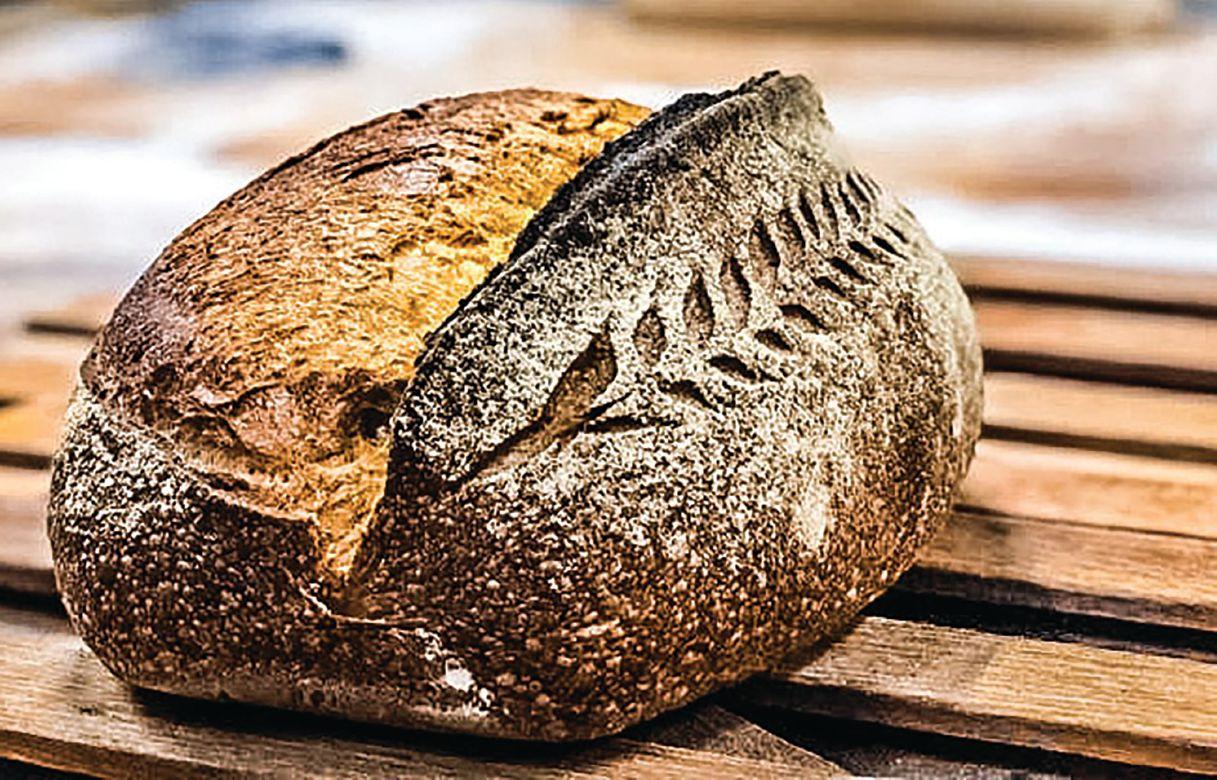

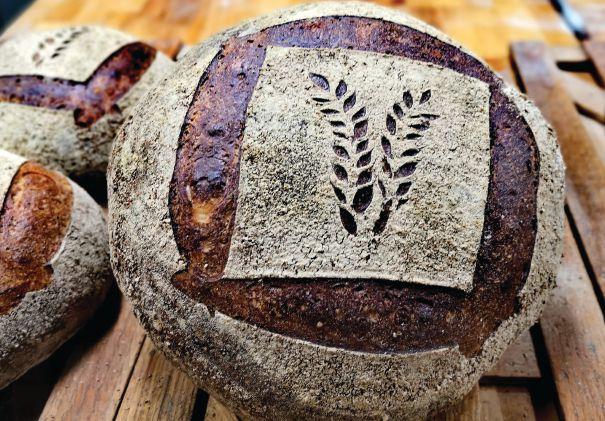
At Beyond Bread, Head Baker, Nicholas Gagnon, trained the old-fashioned way. “I travelled to France to learn from three different bakers. One in Normandy, one in Provence and one just outside of Toulouse,” says the Quebec-born Gagnon.“I lived at the home with each baker for one month and worked for free. In exchange they gave me their knowledge,” Gagnon says. “What was special about each baker, is that they grew and milled their own organic grains, before baking the bread.”
something a little sweeter can pick up the Fig and Walnut Bread, made with 90 per cent white flour, eight per cent rye and two percent whole wheat. Over the Christmas holidays, stollen is added, along with Hutzelbrot, a bread made with a base of rye flour and a rum soaked fruit and nut mixture added.
“We are continually experimenting with making
}“As a baker you want to be able to produce the best bread that you can. This means good fermentation and a good taste. The best way to do this is with organic grains. At Beyond Bread, we search for local, organic, heritage grains,” says Gagnon. The top selling bread is the white sour dough, made from a blend of organic flours including white, as well as seven percent rye flour and two percent whole wheat. The whole wheat sour dough is the second top seller, made with a blend of 70 per cent whole wheat flour and 30 per cent Marquis wheat. “The starter is fermented using our rye mother to add an extra tang to it,” says Gagnon. Customers who want
types of seeds.
The menu, has expanded through the years to include other baked goods. The muffins are all made with spelt flour. The top seller by a landslide is the zucchini chocolate chip. And for snacking there are the ever-popular Vegan Crumble Bars, “These bars are delicious and wholesome, which is why people love
“As a baker, you want to be able to produce the best bread that you can. This means good fermentation and a good taste. The best way to do this is with organic grains.” — Nicholas Gagnon
different kinds of breads. We offer customers a bread of the month. Here we might add ancient grains like Einkorn or kamut,” says Gagnon.
Wild Fire Bakery started making sour dough bread and selling it at the local market, in Victoria, British Columbia. Bread would sell out in mere hours, so, in 2000 they decided to set up a brick-andmortar shop. Today, to keep up with demands, there are a team of over 20.
Flour is still at the base of everything they do, and they mill it themselves, ensuring freshness. Top selling breads include: a rustic white containing unbleached, whole wheat and whole spelt; and whole wheat, with three
them. They are oat based and we use frozen cherries, apple, pear, and spices,” says Erika Heyrman, bakery owner.
Several dozen pies are made from scratch, to bake off or freeze, each week, as well as other fruit-based desserts. Wild Fire Bakery always strives to buy local organic produce, from the interior of British Columbia and into Washington State, working directly with the farmers.
Between 200-300 pounds of rhubarb come through the kitchen each year, as well as other favourites, such as cherries and peaches, “What we don’t use immediately, we chop and freeze for later.” As for berries, they come in
already frozen from a local farm.
“We believe in enhancing the beauty of the ingredients and letting it shine through.” When it comes to cakes and pastry, this could mean eliminating some of the sugar. “When we use apples for example, we really want the taste of. apple.
Initially, when Heyrman started the bakery, everything was certified organic, today she will work with local farms that do not have the certification if she likes the methods and practices used. Heyrman keeps her standards high, noting the commercialization of organic over the years, “Just because it is organic, doesn’t mean we are going to use it.” And, while most ingredients used at the bakery are organic, Heyrman stresses quality is far more important than a label.
As the demand for organic increases, bakers and pastry chefs would be wise to increase production, while keeping this in mind. Organic is associated with healthy, and in today’s climate, health is a top priority.
Karen Barr writes about arts, culture and cuisine. She is a graduate of George Brown College and is a Red Seal pastry chef.
Celebrity chef Chris Ford wanted to make a line of chocolate that would apply universally as couverture, filling and main ingredient. This multipurpose baking chocolate isn’t the standard baking chocolate fare: Ford designs his sweets to be made literally and figuratively made with “Love.”
Ford’s chocolate, “Love” is the latest from his company, Butter Love &Hardwork. The chef’s passion for good chocolate is paired with his love of fighting hunger. For every kilogram of Love brand chocolate that is sold, Ford donates a dollar to Feeding America. Feeding America is a U.S.-based food bank; the charity states that through its partnerships, each dollar helps secure the equivalent of 12 pounds of food, or ten meals. “It’s not a limited, one-time donation,” states Ford. “I would love to do more with them in the future… there’s no sign of stopping.
"I really believe in what they do… and especially because the name is ‘Love,’ I wanted it to be something where we're giving back. I really like what they do and how one dollar goes towards providing ten meals.”
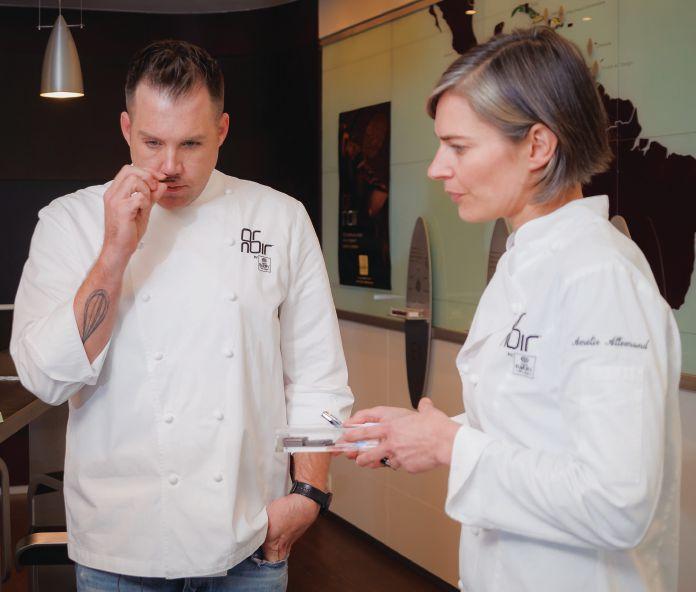
}I offer a very experiential culinary experience with the breakables, where you break it open and there's more candy or chocolate inside. Everything is made with Love; everything's inspired by love.
— Chef Chris Ford
And then I started a blog to document my first pastry chef job and a blog where I shared what I was doing with the pastry community. Then, it turned into a website and then it turned into an ecommerce store,” recalled Ford. “And now, we have Love.”
Love was designed with the help of Cacao Barry’s L’Or Noir laboratory, where he sampled chocolates from around the world to get a sense of the flavour profile he wanted. “It was all done in stages. First, we decided where we wanted the beans to come from, and that was done by flavour. So I decided on the cacao from Ecuador and Ghana. And then it was really just playing with percentages of milk fat.”
When asked why he chose to make chocolate that satisfied usually polarized preferences of both milk and dark chocolate, Ford replied, “the American palate is very milk chocolate-forward, just because we've grown up on really bad chocolate. As a professional, I tend to prefer dark, because, I think dark
usually has more character and more depth. It was definitely a key point for me to for it to be that way…getting the really dark rich top tones from the cacao, but then having the milky ones in the back. So when you eat when you eat Love, the very beginning notes are very rich cocoa, like almost like a really dark brownie. And then it finishes in your mouth almost like a surfboard. And it just goes up and down the roof of your mouth with just this creamy finish. It's almost it's like a bitter chocolate without the bitterness.”
Ford’s company name reflects his ethos. It all started with trying to find a new email handle. “I asked myself what are the three pillars of my life: And it's butter, love and hard work. So it really just started out as a funny email address.
Bakers Journal asked Ford if he noticed an increase in chocolate sales on account of the pandemic. Ford mused that as his shop is online, he feels that his company is thriving. “I would say there’s more sales, mostly because people can't see each other. So, you know, I haven't seen my mom in over a year, so I would send her a chocolate heart and stuff like that, that so I would yes.”
Valentine’s Day is the busiest season for both his chocolate and his brand. “The entire collection is made with Love. That was something very special to me, because I offer a very experiential culinary experience with the breakables, where you break it open and there's more candy or chocolate inside. Everything is made with Love; everything's inspired by love.” / BJ
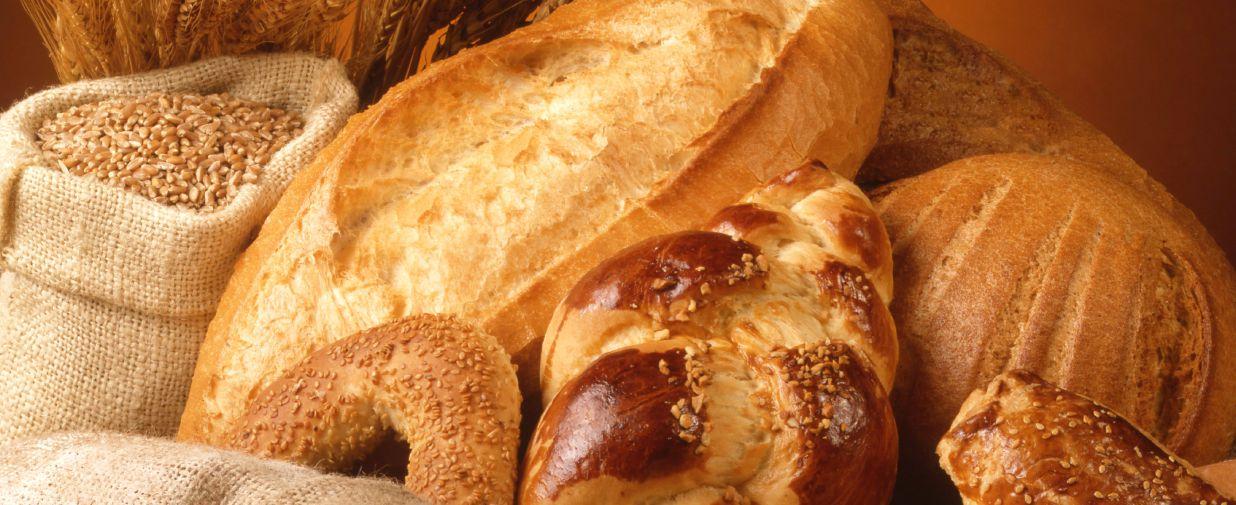





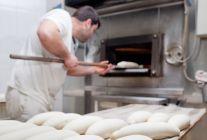
Earlier this year we were all once again subjected to media headlines that consuming refined grains increases the chance of heart disease and stroke. Indeed the research that was the catalyst of these reports concluded that “consuming a high number of refined grains, such as white bread, cereal and croissants, can be associated with a higher risk of major cardiovascular disease, stroke and death”. The issue however is that once again researchers lumped all food products made with refined flour in the same proverbial health basket. In this case it means that breads and rolls were included with cakes, pastries, donuts and other assorted sweet bakery products. It is apparent for all to see that there is a substantial formulation difference in sugar and

fats between a baguette and a donut or Black Forest cake. All one needs to do is look at the nutrition label to know that these products have hugely varying nutrition profiles. Yet nutrition researchers and health officials continue to fail in differentiating these products when looking at nutrition recommendations.
BAC has raised this concern on numerous occasions including the Restrictions on Marketing to Children and the most recent Food Guide update. Evidence presented during these consultation demonstrated that through the Canadian Community Health Survey it is possible to separate the dietary consumption of breads from bakery sweet goods. Yet it’s not happening.

A response by Cereals Canada in regards to the latest research noted that recently, “in collaboration with former US Dietary Guidelines Scientific Advisory Committee members, 11 consensus statements were scientifically agreed upon and included the current categorization of refined grain foods may need further delineation, particularly because current evidence suggests differences in nutrient contribution from breads and cereals in comparison to indulgent grain foods such as cakes, cookies, and pies.”.
The statement is clear that future research should consider distinguishing different types of refined grain foods with the goal of potentially creating an additional classification of grains that goes beyond whole and refined. For example, dietary pattern focused research needs to separate refined grains (i.e., breads and cereals from cakes, cookies, and pies) when assessing nutrient intake, diet quality and health-related outcomes”.
BAC will continue to press this message to health professionals and government officials.
Proposed Natural Claim May Exclude Enriched and Other Flour Based Foods
The Canadian Food Inspection Agency (CFIA) is proposing a new definition for calling a product “natural” that would exclude most if not all bakery products from using the claim. According to the CFIA
the new definition would recognize a food as “natural” if the food and its ingredients meet the following conditions: not to contain, or to ever have contained, an added vitamin, mineral nutrient, artificial flavouring agent or food additive or does not have a constituent or fraction thereof removed or significantly changed, except the removal of water.
The enrichment of wheat flour with vitamins is required in Canada through regulation of the standard of identity. Wheat also goes through a substantial change in the milling process which may also be a disqualifying criteria.
BAC response to the consultation has been to request an exemption for products using milled and/or enriched flour.


Dave
Fuller, MBA is a Certified Professional Business Coach and the author of the book Profit Yourself Healthy. Feeling blindfolded?
Email dave@pivotleader.com

It was all fun and games with a class of kids having an outdoor adventure while playing a game of trust when the accident happened. The trust game involved one child leading the other who was blindfolded around the campground and letting the blindfolded one try to figure out what they were encountering while avoiding danger. Unfortunately, Cassidy couldn’t see the tree because she was blindfolded and Emily didn’t see the root because she was concentrating on leading Cassidy to the tree. The moment Cassidy tripped over the root and smashed her face into the tree, is exactly the instant her tooth popped out.
Planning is the development of those ideas and the process of documenting them so that others can appreciate your plan.
seeing opportunities and dangers. Others were misguided while others just stuck their heads in the sand sending their people home in order to give everyone some time to figure things out.
For many businesses 2020 was like that. Companies were going through the forest without a plan blinded by the unknown. As a result, there were many unfortunate events leading to disastrous results. Some companies were led managed by seemingly blindfolded people who didn’t adjust their strategy until late in the game preventing them from
The problem with many businesses is the fact that they had no plan in place to avoid the dangers facing them, which resulted in confusion and panic. Unfortunately, many organizations don’t understand what to do when it comes to planning. They don’t have a process to engage their teams in the planning process other than the accepted traditional dictatorial approach “I have this idea and I want you to follow”.
Regrettably for many businesses, when they think about planning, budgeting is what happens. For many years in my retail business I didn’t plan. Because I had the opportunity to sit on the boards of some national associations I was exposed to the idea of planning, however many of those organizations didn’t plan well and I though “planning equalled budgeting”. I would automatically figure on an increase of 5% across the board for my expenses and hope for the best In hindsight, planning would have made a significant difference in several businesses I naively instigated.
What exactly is effective business planning? Every leader has an idea in their mind of where they want the organization to go. Planning is the development of those ideas and the process of documenting them so that others can appreciate your plan. Effective business planning includes involving others in that process and having procedures to keep everyone accountable as things move forward. On December 15th I will be offering a free half day workshop online for any organization, profit or non profit who would like to engage their team for the upcoming year. Email me if you want your team to become involved and I
will send you the details.
When I started engaging my team in annual planning, I realized what I had been missing for so many years. As a leader I thought that I was the only one responsible for setting the direction and coming up with a plan for implementation. By getting the key people in my business involved in the process I found that we had better ideas, and because they shared my commitment, those ideas where implemented for the full year. The results were amazing. Not only did we perform better, my staff seemed happier and because they had come up with many of the ideas they looked forward to implementing them. As a result, I was able to spend less time micromanaging and more time on higher level issues.
It can be fun to walk around blindfolded once in a while, however the dangers of a misstep can be significantly reduced when numerous people are looking for challenges or opportunities. Luckily for Cassidy her mom had a dental program that enabled her to continue to have a beautiful smile and fortunately, decades later, Cassidy and Emily remain friends.

Dried in the warm California sunshine with no added sugar or juice, California Raisins provide flavour, texture, and colour to a wide variety of products. Their natural sweetness allows for a sugar alternative in formulations, and their high-water binding capacity helps to retain moisture in bakery products. California raisins are an excellent addition for bakers catering to the growing number of health-conscious consumers and have numerous benefits, including:
Sugar Alternative: California Raisins provide flavour, texture, and colour to a wide variety of products. Their natural sweetness allows for a sugar alternative in formulations.
Texture / Fat Replacement: California
Raisins are plump, fresh tasting and have a soft “chew” that mimics fat and richness. Raisins act as a fat-replacer in baked goods without the addition of significant amounts of water and offer pleasant chewiness in a wide range of products. They are not gritty and typically free from large sugar crystals. California Raisins function well in fat-free baked goods, cookies and cakes.
Texture and Skin Integrity: The skin of the California Raisin is not easily damaged by processing aids or by other processes. Therefore, raisins retain their shape and integrity during preparation. In fact, raisins plump
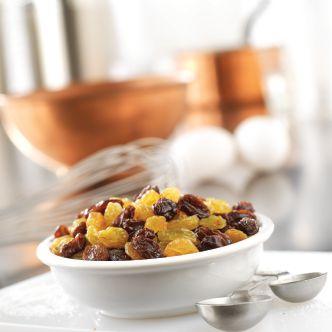
California raisins are an excellent addition for bakers catering to the growing number of healthconscious consumers and have numerous benefits.
during microwaving and baking, building volume and mouthfeel.
Binding: California Raisin sugars create a firm texture that can help bind dry ingredients in foods such as bars, snacks, cookies, desserts and other dishes.
Water Activity: At the same moisture content, California Raisins generally have a lower water activity than other dried vine fruits because of their intact skin and fructose-glucose content. This prevents migration of moisture to or from
ingredients in preparations and allows them to be added to recipes without concern for adding unneeded moisture.
The California Raisin industry offers a variety of products that are suitable for both consumer and industrial usage. Most of the products offered are of the “Vitis vinifera” Natural Seedless varietal type, including the Thompson seedless, and are typically dried by the sun, whether it is on paper trays or dried on the vine.
California Raisins are also available as paste and juice. Raisin Paste is made by extruding raisins through a fine mesh screen. Raisin paste can be used to add visual appeal and flavour to many products. It can be used as a humectant and natural mold inhibitor and is compatible with a variety of flavours. It also sweetens naturally, contains fibre, and has low microbiological counts, pH and moisture activity.
Raisin Juice Concentrate is a pure extract of raisins evaporated to produce a selfpreserving concentrate that enhances flavour profiles and is a natural colouring agent. This juice is a natural preservative and sugar alternative that helps extend the shelf-life of bread products and naturally sweetens and colours baked goods. It can also be used as a natural binding agent or syrup to control breakage in cookies and crackers and maintain moisture in baked goods. •
The possibilities to enhance your baking with the natural sweetness of California raisins are endless. To learn more and for additional inspiration, visit www.californiaraisins.ca.
BY DIANE CHIASSON
Why small bakery operations should implement effective systems

Your employees are the ones who deliver that “wow” experience. If you want to develop good staff relations and create a better culture in your bakery, then you must have good systems in place. Small independent bakery owners should keep in mind that every bakery chain began as a single, independent operator. By establishing systems and processes they can duplicate the successes of their first bakery store. It's important that you learn how to develop and institute systems. As an owner or operator, you should always think of new ways in helping your staff members do their job much easier and better by creating and designing proper systems geared toward meeting the basic service expectations that are common to all bakeries, including:
}• Quick and polite greeting
systems should include Back-of-thehouse systems; Front-of-the-house systems; Management systems; Personal systems; Catering, and Delivery systems.
This is the first of a two-part series on creating effective systems to improve your bakery operations.
Implement effective systems to ensure consistent guest experiences
Effective systems and controls are the cornerstone of successful bakeries. Most of you think that systems are challenging to put together, boring, and time-consuming. Get this out of your mind. A system is essentially the same as a recipe which is putting together ingredients, steps and instructions designed to make a specific dish. The end result should always be the same-tasting and looking cake, pie, muffin, or sandwich, regardless of who made it. Basically, a system is a process, procedure or series of steps designed to produce a standard result;
Most of you think that systems are challenging to put together, boring, and time consuming. Get this out of your head.
• Courteous and well-dressed staff
• Timely service
• Hot food hot and cold food cold
• Consistency
• Professionalism
• Attentiveness
• Cleanliness and sanitation
• Comfortable eating/dining experience
Unfortunately, business owners sometimes are too busy, and they get distracted and forget. If you want to ensure your customers receive the ultimate guest experience, then you must focus your attention on improving your systems. Good and effective systems are the building blocks of every foodservice operation. It will help you stay on track and keep your energy for great guest experience, rather than struggling to remember details. Effective systems will not only ensure consistency and guest satisfaction, but they will also help you with your cost control, which is crucial during this economy. Your operational
it's the perfect way to create results that are constant, predictable, measurable and achieve the desired level of customer service and experience.
A proper order form or template should list all the ingredients and products that your back of the house bakery uses. Having a streamlined ordering procedure and proper inventory control is crucial in maintaining the consistent cost of sales and product availability.
You could easily make a basic multipurpose form in an Excel sheet, then print it and post it on a clipboard in the kitchen, behind your counters, or office. If you Google it, I am positive that you could also download a free order form or template. This form should be highly visible when ordering, receiving, and maintaining accurate control inventory. Write the month very top of your sheet, and then have many columns along the line below, populated with the following:
• Inventory ID or Item No.
• Date of last order
• Item Name
• Description
• Unit Measure (or UM for Unit of Measure – whether it's a case, bag, sack, bottles, Lb, Kg, etc.)
• Stock Location (Basement, Shelf 4, or Store Room A, Shelf 2, or Kitchen, on a pallet)
• Supplier or Vendor Name
• Unit Price
• Quantity in Stock
• Inventory Value
• Reorder Level
• Days per Reorder
• Item reorder Quantity
• Item discontinued
• Week 1, Week 2, Week 3, Week 4
• Total Value
• Employee Initial
2. UTENSIL AND SMALLWARE CHECKLIST
Another useful form used in the back of the house to ensure availability and quality is the utensil, smallware, and equipment checklist. This checklist usually includes a listing of all products such as utensils, smallwares, equipment, and other supplies needed throughout the bakery store. Just be aware that running out of product or having product disappear will cost you money. You should always keep track of your food items and your smallwares, linens, uniforms, cleaning supplies, and other merchandise. Run a checklist to see which tools you use daily, and which ones are getting worn.
Check in next month, for our two-part series on creating effective systems to improve your bakery operations in the May issue. / BJ
Diane Chiasson, FCSI, president of Chiasson Consultants Inc., has been helping foodservice, hospitality and retail operators increase sales for over 35 years by providing innovative and revenue-increasing food service and retail merchandising programs, interior design, branding, menu engineering, marketing and promotional campaigns. Contact her at 416-926-1338, toll-free at 1-888-926-6655 or chiasson@chiassonconsultlants.com , or visit www.chiassonconsultants.com
There has been a recent surge in people seeking healthier eating approaches, due to allergies or simply for better health. The 2020 Food & Health Survey states that “more than half of all consumers say the ‘healthfullness’ of their food choices matters more now than it did in 2010.” However, consumers do not want to give up their indulgences; instead, they look for healthier alternatives within the baking category. Across Canada, there are increasing numbers of bakeries taking up the mantle of alternative baking. Here we meet with a few different outlets to better understand their inspiration and offers.
Chrysta Morkeberg’s journey into health-driven baking began in 2011 when her son was diagnosed as unable to eat gluten, dairy or eggs. Until this point, Morkeberg baked and cooked in a traditional style, and the implications of this diagnosis shook her world. To support her son, she decided to follow the same restrictions. She unexpectedly saw considerable improvements in her health, further fueling her enthusiasm for and experimentations in food for health, which some years later was critical in helping her husband recover from an accident and subsequent illness. Her life experiences inspired her to open Food In The Nūd.

Recently considered a niche market, paleo desserts are gaining popularity.
}For Morkeberg and her team, customers' reactions are the highlight of their day; they've had people cry when they discover that everything is gluten and dairy free.
The bakery follows the principles of paleo eating; everything is gluten and dairy-free and a selection for plant-based diets. Since the store caters to a variety of needs, almost everything is a favourite for someone. However, like many bakeries, their overall best sellers include cookies and Ginger Sammys (similar to a Whoopie Pie). Morkeberg has noticed increased interest from
parents in more wholesome children’s treats such as birthday smash-cakes, where fruits sweeten the cake. For Morkeberg and her team, customers’ reactions are the highlight of their day; they’ve had people cry when they discover that everything is gluten and dairy-free, and they can take their pick of the entire store. For Morkeberg, Paleo “is not a diet, but a lifestyle,” a way of living
focused on health and wellbeing, which she promotes through her products and the ambience in her store.
Interestingly, as well as a few wholesale accounts, Food In The Nūd also gains sales from local naturopaths. For patients struggling to find baked and other goods for their restrictions, the naturopaths ‘prescribe’ a visit to Food In The Nūd, an extraordinary accreditation for the health standards of the treats they offer.
GRATIFY, PENTICTON, BC
Connie Oickle, the founder of Gratify, a
registered holistic nutritionist, wanted to create sweet treats that allow people to ‘indulge better.’ While they are classified as a bakery, their approach is a little different. Gratify treats are available to people with various dietary requirements, but more importantly, they nurture the body. Ryan Oickle, co-owner, noted that while dietary requirements attract specific customers, many people simply enjoy the snacks; the fact it’s healthier is merely a bonus. As Ryan said, “you don’t have to be vegan to eat plant-based foods.”
Gratify took classic baked goods such as cinnamon rolls, cookie dough and brownies and re-created them with raw, plant-based ingredients ensuring they are all naturally gluten, dairy, refined, and artificial sugar-free. The 2020 Food & Health survey highlighted the growing focus on reducing sugars finding that 74per cent of their respondents tried limiting their sugar intake in 2020. Further noting that “the nature of indulgence is changing...as consumers treat themselves less frequently with more premium or ‘better for you’ products.” It is rare to find sweet treats free of refined and artificial sugars, so this is a strong selling point for the health-aware consumer purchasing at Gratify.
As demand increases for healthy products in eateries and other outlets Gratify opened sales to a select number of local businesses to buy Gratify products to cater to this evolving customer need. However, Gratify has signed a lease on a larger property that will provide them with a seating area and expand their wholesale activity. This expansion is a testament to the growing demand for their products and healthy alternatives.
In the past, diets have easily been dismissed as fads; however, we’re seeing a move toward lifestyle changes that embrace long-term change to eating habits, which are becoming embedded in individuals and societies’ psyche. As a result, the demand for healthier alternatives and catering to the growing rate of intolerances is predicted to grow. An article by Dawn Foods noted that “dedicating a portion of your case for baked goods that make people feel good about their food choices is a smart
decision for 2021.” Your bakery’s focus might rightly remain on traditional baked treats; however, if you sell directly to the consumer, it is worth considering if you can collaborate with alternative bakeries to reach this growing healthconscious consumer. / BJ
Emma Davies is a freelance writer and wellbeing advocate. She writes articles and supports organizations and professionals to develop their wellbeing and business.
On April 19, 2021 Canada’s baking industry experts share advice, baking techniques and financial know-how to help you navigate your business. Join us at 1pm, and learn from financial experts, bakers and patissiers about how to thrive, not just survive in the “new normal.” Learn more: bakersjournal.com/ virtual-events/bakers-journal-virtualinnovation-day/




• Front Cover Story
• Travel to Bakery Showcase 2021
*see website for specifics
ELLAJOSYULA
The events of 2020 have made quite an impact on all areas across the food industry, with COVID-19 accelerating several trends that are likely to endure post-pandemic. Immunity and ‘conscious indulgence’ will continue to drive the demand for new and innovative flavours in baking, as well as foods that provide health benefits and emotional comfort. For this reason, ingredients such as spices, nuts and cocoa are in high demand to introduce a depth of flavour in baking applications. So, how can bakers make the most of these trends to create healthy, delicious products that consumers love?
Following the pandemic, there has been increased focus on the role diet plays in health; consumers are searching for ‘health halo’ products that are both nutritional and tasty. Nuts, a popular category for food inclusions, are growing in demand due to the importance of health and wellbeing and the rise of plant-based eating. As a result, bakers are using nuts, such as almonds, cashews, hazelnuts, pistachios and walnuts as base ingredients to create healthier baked goods.
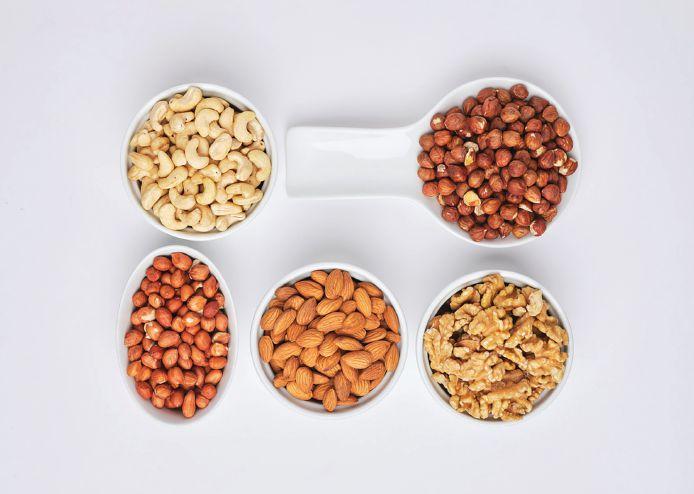
Bakers are using nuts as base ingredients to create healthier baked goods, adding protein and flavour to their goods.
}Nuts, a popular category for food inclusions, are growing in demand due to the importance of health and wellbeing and the rise of plant-based eating.
recipes including banana breads, coffee and walnut cake and brownies. As well as containing essential healthy fats, these flours are also low in carbohydrates helping with blood sugar control.
A range of nut-based products are used in baked goods with the aim of replacing perceived ‘unhealthy’ ingredients. Foods made with refined wheat, such as plain white flour, are high in carbs but low in fat and fibre – which may leave consumers with undesirable spikes in blood sugar levels. As well as whole wheat flour and other grain options, nut flours also offer a nutritious alternative. High in fibre and protein, these flours are made from nuts such as almonds and cashews that have been blanched, ground to a powder and sifted so that they can be used as flour in baking and cooking
Defatted nut flours are another option when it comes to adding additional protein and reducing fat content in bakery products. Furthermore, the high content of minerals within defatted nut flours, such as magnesium, iron, potassium, copper, manganese, and zinc, enable them to act as a nutritious alternative to grain flour. Defatted nut flours are an ideal choice for many bakery applications, such as macarons, biscuits and sponge cakes. They can also be used as a replacement for skimmed milk powders when creating vegan chocolate spread for used in plant-based baked goods.
As another example, where hydrogenated vegetable oil (HVO) and sugar are commonly used to create cream fillings in baked goods such as cookies and wafer rolls, OFI has developed nut-based pastes which can be used as a healthier, tastier alternative. This formulation enables the nut paste to solidify after insertion, overcoming stability issues associated with unsaturated fats in nuts that – in other cases – would cause the paste to ooze out of baked products.
Consumers lean into comfort foods during stressful times. A poll conducted by OnePoll found that two in three Americans were reverting to childhood food favourites and eating more comfort foods during the pandemic. This is another trend predicted to last in 2021, with 69 per cent saying they will continue to enjoy the same amount of comfort food that they are now, postpandemic.
For this reason, bakers are reimagining
traditional flavours in foods and creating new and unusual flavour recipes. These include combinations of cinnamon and guajillo pepper added to well-loved beverages such as hot chocolate. This ‘sweet heat’ has become a popular flavour combination in Mexican-inspired hot chocolate flavour baked goods, offering the comfort of chocolate with an adventurous kick. Olam Spices, part of OFI, has seen growing demand for warming spices such as ginger, cinnamon and turmeric – all appealing to the sweet-toothed consumer looking for ‘heathier’ yet indulgent products. These warming flavours are all associated with childhood dishes which help to trigger an emotional connection to happier times – such as apple pie or gingerbread.
As consumers seek out bolder flavours, we can expect to see even more spice and botanical flavours move into the mainstream. This is a trend that has already been explored in Asia, where consumers are increasingly opting for baked goods made with matcha and miso, due to their mood or energy-boosting benefits, or wasabi-based desserts.
As the uncertainty around the pandemic continues, traditional bakery ingredients such as cocoa are also thriving as a classic comfort for consumers worldwide. Cocoa powder such as deZaan D11S, which adds intense flavour and rich colour to a broad range of applications, is ideal for manufacturers looking to create the classic chocolate flavours consumers are craving right now.
}Spices, herbs and seasonings can not only serve as salt substitutes, for example in baked goods, but can add an umami effect and greater depth of flavour.
Throughout 2020, we’ve seen clean label grow as a consumer trend – putting greater focus on products’ nutritional value, origin and sourcing. While new diets pop up all the time, clean-label eating has proven not to be a passing trend. The reduction of salt in the diet is crucial as research shows that an excess of salt in the diet leads to an increased risk of high blood pressure and stroke. Spices, herbs and seasonings can not only serve as salt substitutes, for example in baked goods, but can add an umami effect and greater depth of flavour. Spices can also add natural colours and flavourings to products. For example, turmeric may be used as a natural source of colour to replace additives such as yellow 5 or yellow 6. These naturallysourced ingredients offer a way for formulators to tap into this clean label trend – allowing consumers to enjoy healthier products.
Consumers also define healthy products by the natural ingredients used and their traceability. To ensure bakers don’t fall behind the clean-label trend, ingredients that are sustainably sourced in a transparent way are key, allowing consumers to know exactly where their food comes from. This is why OFI developed its sustainability insights platform AtSource, which gives customers a single view across their supply chain sustainability parameters with multiple social and environmental metrics.
Olam Cocoa, part of OFI, is also looking at ways to ensure sustainability, achieving 100 per cent traceability of directly sourced cocoa across its global supply chain, through an
end-to-end system which tracks the cocoa at every stage. Traceability within the cocoa industry has been a significant challenge due to the fragmented farming systems and lack of infrastructure in many cocoa-growing areas. By ensuring traceability, customers are offered transparency.
Cocoa can also be a great way of adding colour and flavour to bakery and snack applications, without the need for as many artificial flavourings or additives. What many consumers don’t realize is that most dark cocoa powders go through the process of alkalization, meaning bakers must list it on labels as “cocoa processed with alkali”, which can be confusing for consumers. As a result, Olam Cocoa has created deZaan TrueDark, the first ever natural, non-alkalized dark cocoa powder that offers a powerful cocoa taste and rich brown colour. A key benefit of this is that it can be listed simply as “cocoa” on product labels, allowing bakers to develop new recipes and formulate existing ones to create simpler ingredients lists that appeal to consumers.
The trends that have shaped 2020 are undoubtedly going to last post-pandemic. Nonetheless, balancing flavour with functionality will be crucial, as bakers will look to combine ingredients to create new, unusual, flavours that will meet a wide range of consumer trends as well as provide adventurous food choices. / BJ
Kamesh Ellajosyula is the Global Head of Innovation at Olam Food Ingredients. More information on Olam can be found at www. olamgroup.com.
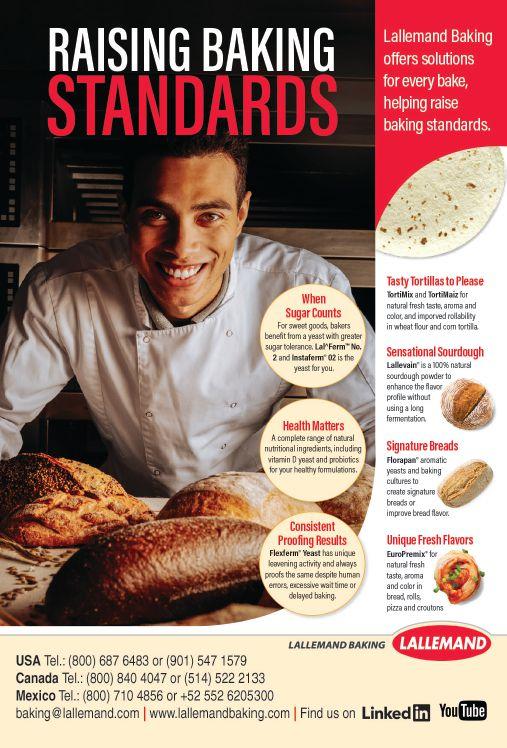




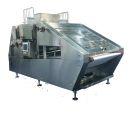
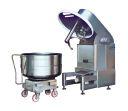

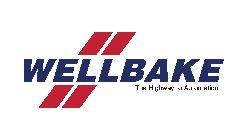




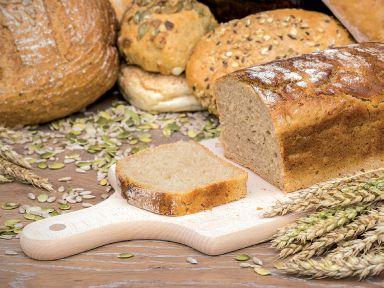


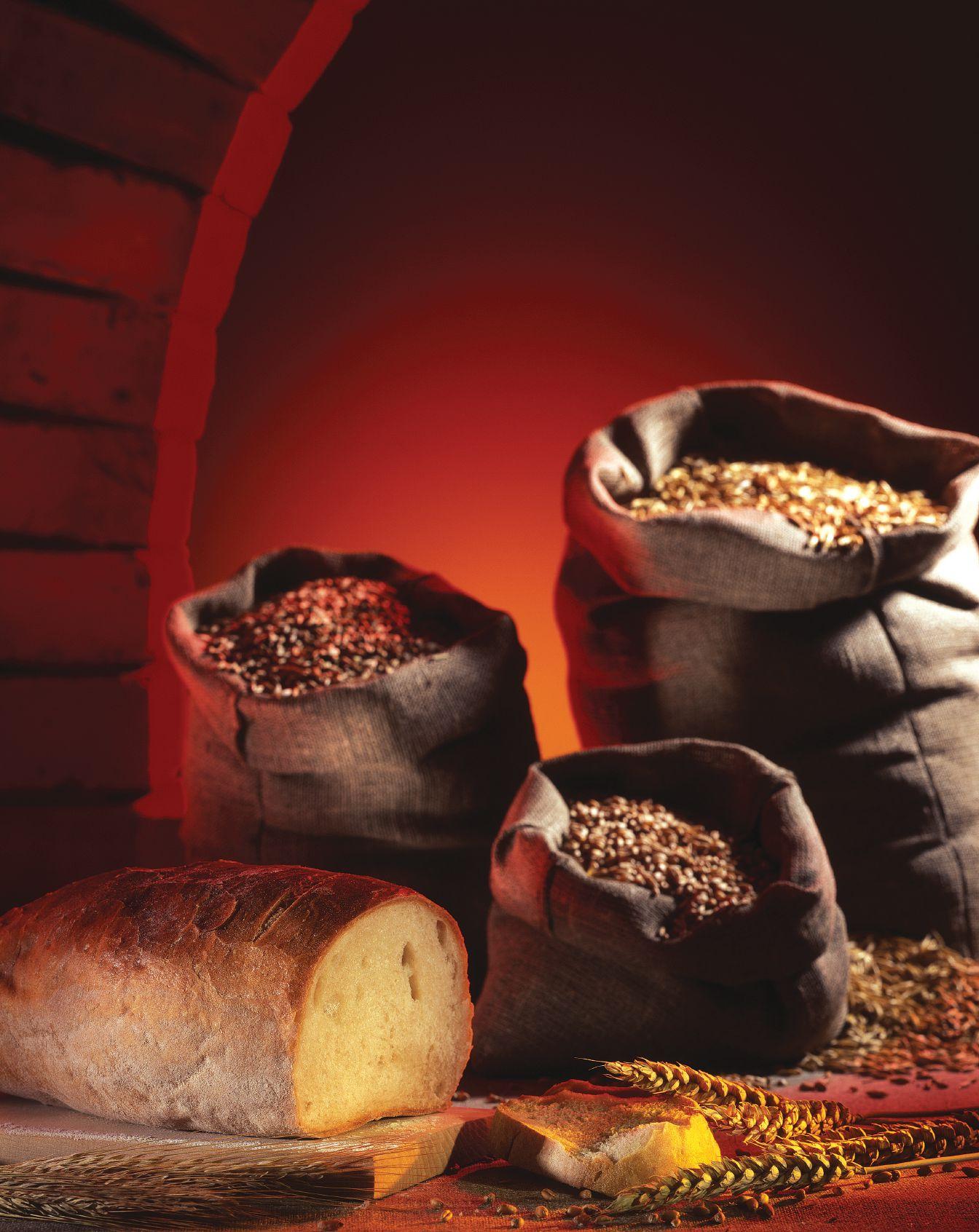


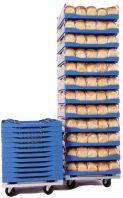




BY JANE DUMMER
How the growing trend in organic ingredients are giving rise to organic baking

Organic ingredients are now available in continuous supply, which allows manufacturers, and independent bakeries to devote their product offerings to the category. Plus, over the last decade, organic products have become more mainstream with steady growth. The Canada Organic Trade Association (COTA) commissioned Leger 360 to poll 1,000 consumers nationally in August 2020 to gauge the perception and appetite for organic food during the pandemic. This research reveals organic products sold in Canada now account for 3.2 per cent of all grocery sales. Canadian consumers are spending $6.9 billion annually on organic products. This is up from 2.6 per cent and $5.4 billion in 2017.
}are 100 per cent certified organic, and we have seen the most demand for certified organic bread. We’re thrilled that Canadian certified organic oat milk became available mid last year. We love to use it because the organic oats are grown in Western Canada. We’ve had an intense demand for baked goods, even more for the savory over the sweet ones. It seems more and more people are switching to healthy organic snacks.”
On the savory note, Anne Druschitz, Corporate Research Chef, The Edlong Corporation in Chicago, describes, “Nostalgic organic flavours have been popular, especially in different formats. The popular ones have been Cheddar and Monterey Jack. Organic commodity cheese can be pricey, and supply can exceed demand, so using a smaller amount of cheese and boosting its impact with organic cheese flavours is a way to keep your consumers and the procure -
The data shows that Canadians are buying more organic products year over year, even during a global pandemic.
In a previous COTA research document, The Organic Food Processing Report: State of the Industry 2018, the total value of the organic baking sector, including ingredients was identified as $237.4 million in 2017. Tia Loftsgard, Executive Director, COTA explains, “The data shows that Canadians are buying more organic products year over year, even during a global pandemic. From avoiding exposure to pesticides to higher animal welfare standards, consumers are making choices that align with their health priorities and values.”
Along with securing a consistent supply of organic ingredients, consumer trends have contributed to the rise in organic baked goods. Clean label, the popularity of artisanal techniques and demand for organic gluten-free ingredients, have supported this growth.
Independent bakeries like Alpine Bakery, the first and only certified organic Bakery and Café North of 60 (located in Whitehorse, Yukon) can easily respond to their customers and succeed. Silvia Streit, Owner, explains, “All our products
ment team happy.”
People are more educated on product labels and are better able to seek out products that meet their preferences.
Ashley Sabo, Senior Food Scientist, The Edlong Corporation, agrees, “Consumers are becoming more aware of what they’re eating and where it comes from, with Innova citing Transparency as the number one food trend in their list of Top 10 Food and Beverage Trends to Accelerate Innovation in 2021. At Edlong, we’ve seen an increase in requests from customers for organic flavours. Not just organic compliant but organic certified flavours specifically. By having organic certified flavours, customers now have room for other non-certified organic ingredients, like acids or gums, in their formula while remaining below the maximum amount needed to keep the organic certified label recognition. It’s important for all companies, including flavour companies, to keep up with the times and continue to innovate. We want to make sure we can meet our customers’ ever-growing
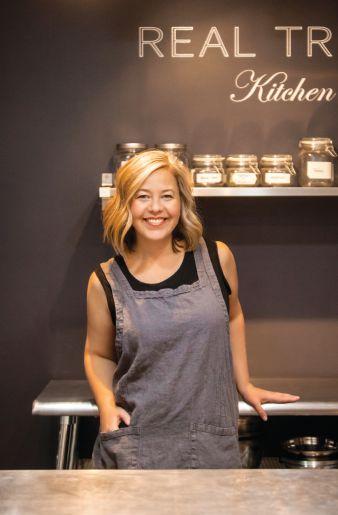
and changing expectations in food.”
Jacqueline Day, Founder & CEO, REAL TREAT, a Canadian company that creates gourmet organic cookies at the foothills of the Rocky Mountains in Alberta recalls, “In the beginning just about every ingredient was difficult to get. Or it may be more accurate to say there were far fewer sources for procurement. On many occasions we found ourselves having to pay retail for organic chocolate or nuts because our one and only wholesale supplier was out. But that has changed over the past five years. Even some of the mainstream conventional wholesalers have organic sections in their catalogues. Today, we see the demand for organic treats that are delicious and satisfying in the way conventional baked goods are. The pandemic has only accelerated that trend as people seek out options that bring comfort and break up the monotony of being stuck at home, while also supporting good health.” / BJ
Jane Dummer, RD, known as the Pod to Plate Food Consultant, collaborates and partners with the food and nutrition industry across North America. www. janedummer.com
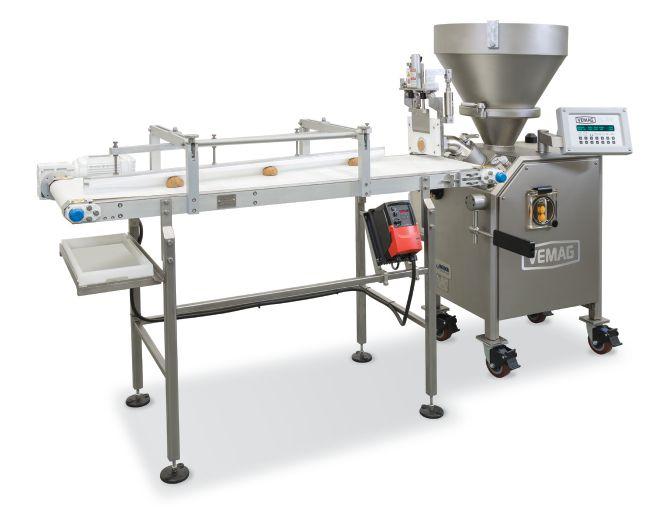
“I’m John Kirkpatrick
I’m a member of Reiser’s team of customers to improve their product. When it comes to buns and rolls, I have
I’ll help you keep pace and succeed in this fast-changing market. Are you ready to add more versatility to your bun and roll production line? Let me show you how.”
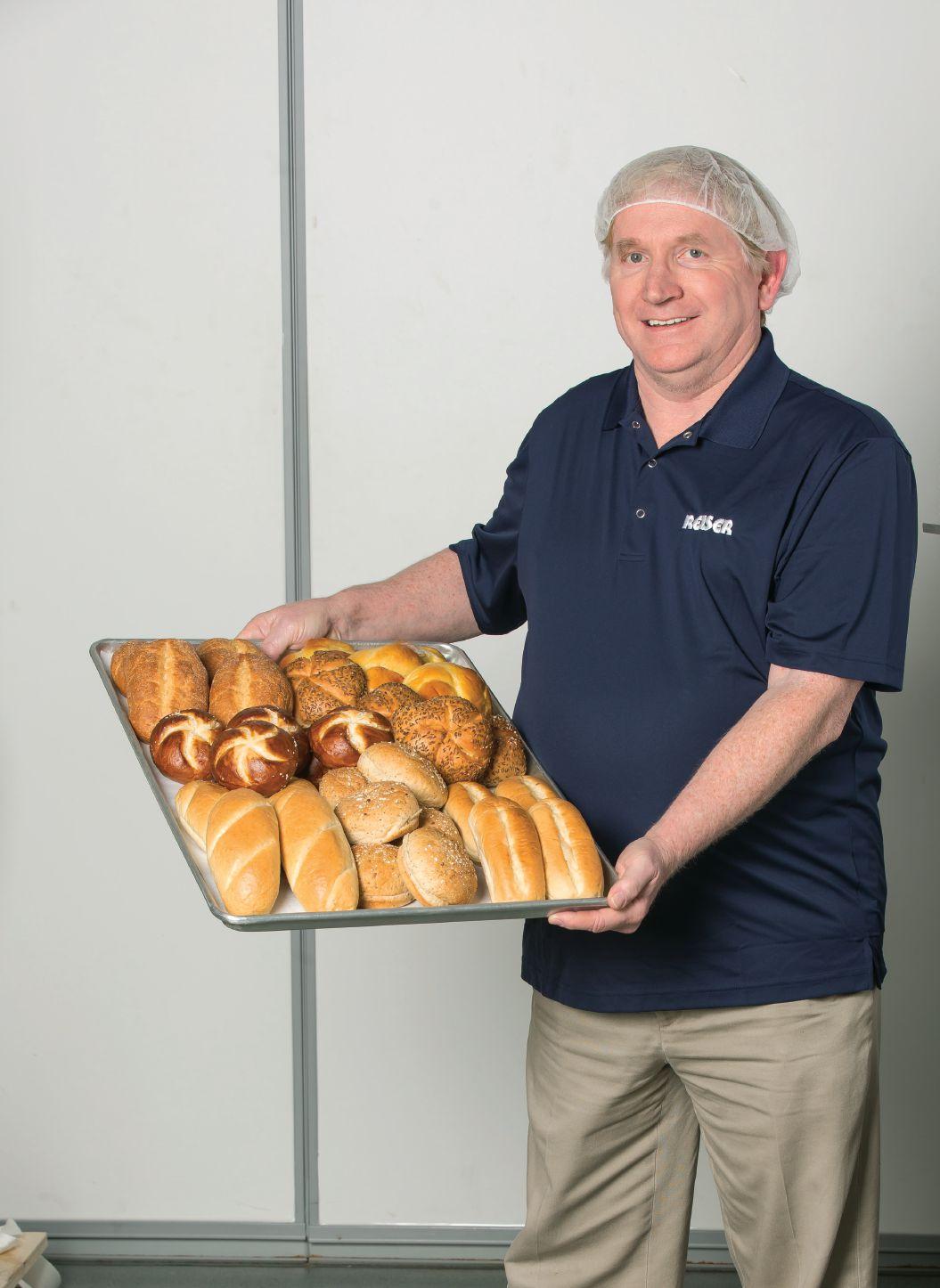
www.reiserexperts.com
Reiser Canada
Burlington, ON • (905) 631-6611
Reiser
Canton, MA • (781) 821-1290
Select Cake Mixes from Dawn are now made in Canada. The high-quality ingredients that inspire your amazing cake creations are now closer than ever. Our facility in Burlington, Ontario gives you domestic access to our high-quality, flavourful cake mixes—and we’re always just a phone call or a click away with delicious recipe and decorating inspiration to help you create more memorable moments. To learn more, call 1-866-277-3663 or visit www.dawnfoods.com/ca/madeincanada
For a complete listing of all of our Dawn cake mixes and assorted bakery ingredients made in Canada, visit www.dawnfoods.com/ca/madeincanada
